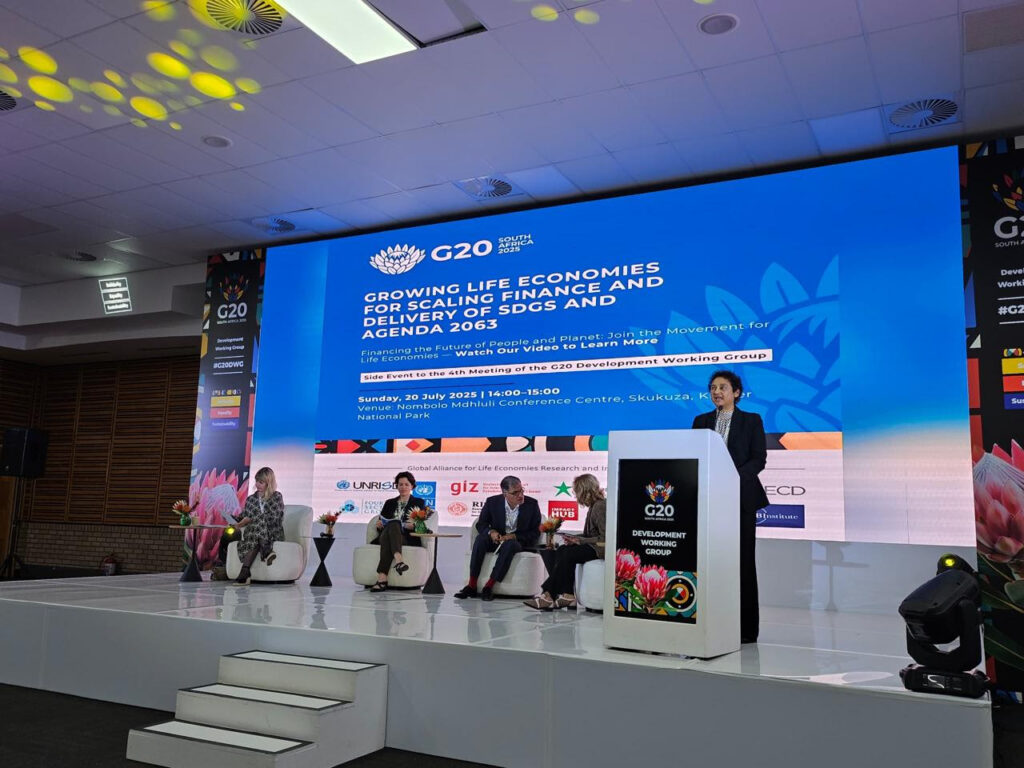
By Baboloki Semele: At the heart of the 4th G20 Development Working Group (DWG) meeting, a compelling call to action resonated from Africa’s leading development voices. AUDA-NEPAD, in collaboration with the African Union Commission, urged G20 nations to institutionalise Life Economies—a bold, people- and planet-centered economic framework—as the next frontier for financing and accelerating the Sustainable Development Goals (SDGs) and Africa’s Agenda 2063.
In a keynote address that struck both urgency and hope, Dr. Patrick Olomo, Acting Director of Economic Development, Integration and Trade at the African Union Commission, challenged traditional economic paradigms. “Traditional GDP-driven models have taken us far, but the challenges and opportunities our nations face today demand new economic frameworks. Life Economies represent precisely that alignment—economic systems that embed well-being, shared responsibility, and environmental stewardship at their core,” he declared. Dr. Olomo’s words signaled a shift from economic orthodoxy to holistic, inclusive prosperity. “This is not theory,” he insisted. “It’s emerging practice in all G20 countries. Let us, in this room, sow the seeds of a new development paradigm, one where prosperity means flourishing societies and thriving ecosystems, not just economic growth alone.”
The event, aptly titled “Growing Life Economies for Scaling Finance and Delivery of the SDGs and Agenda 2063”, convened policymakers, development practitioners, and thought leaders from India, Brazil, Germany, the EU, and international institutions. The diversity of representation reflected the universal urgency of the moment and the broad consensus forming around the Life Economy model. Through detailed case studies and policy examples, participants illustrated how circular economy policies, social stock exchanges, and well-being budgets are not abstract concepts but proven tools to deliver tangible results—from job creation to climate resilience and social equity.
Prof. Bartholomew Kingsly Armah, echoing Dr. Olomo’s sentiments, underscored that Life Economies are no longer aspirational. “This isn’t just theory—it’s a call to action,” he said. Highlighting the current momentum, Prof. Armah pointed to social protection programs, ecological regeneration initiatives, inclusive finance models, and emerging legal reforms as evidence that Life Economy principles are already shaping new development realities. “We must move from fragmented initiatives to coordinated and scalable interventions,” he urged, advocating for policy coherence and stronger alliances. At the center of this effort is the Global Alliance for Life Economies Research and Innovation (GALERI), a voluntary and inclusive platform designed to foster collaboration, evidence-sharing, and policy co-creation across the G20 and beyond. GALERI, he explained, provides a practical mechanism to transform inspiration into impact at scale.
AUDA-NEPAD reaffirmed its commitment to championing Life Economies as a transformative model aligned with key DWG priorities, including building social protection floors, enhancing domestic resource mobilisation, and scaling finance for sustainable development. As a development agency grounded in African realities and aspirations, AUDA-NEPAD is positioning the Life Economy framework as not just Africa’s innovation, but a global imperative.
The event concluded with resounding appreciation for South Africa’s leadership under the G20 Presidency and special recognition of Ms. Josephilda Nhlapo-Hlope, Chair of the G20 DWG, for her visionary role in facilitating this timely conversation. Her dedication to inclusive development and her stewardship of the DWG were lauded as instrumental in elevating the Life Economy discourse onto the global agenda.
As the world grapples with intersecting crises—from inequality to climate change—the AUDA-NEPAD and African Union message was clear: sustainable development must evolve beyond metrics and markets. It must be rooted in life itself.